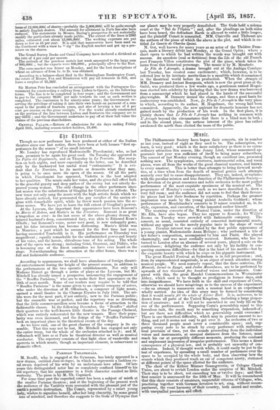Musir.
I The Philharmonic Society have begun their concerts, six in number as last year, instead of eight as they used to be. The subscription, we learn' is very good ; which is the more satisfactory as there is no extraordinary attraction this season, like Jenny Lind, whose announced appearance last year was sufficient of itself to bring many subscriber:. The concert of last Monday evening, though an excellent one, presented nothing new. The symphonies, overtures, instrumental solos, and vocal pieces, were all from the works of the great classical masters, and kniiwn to every amateur. This is better than attempts to bring forward novelties, at a time when from the dearth of musical genius such attempts scarcely ever fail to cause disappointment. They are indeed, at variance with the peculiar mission and true function of the l'hilharmonie Society— the devotion of its great resources and noble orchestra to the most perfect performance of the most exquisite specimens of the musical art. The programme of Monday's concert, such as we have described it, drew a
• very full room ; and the audience did not seem to feel that their favourite pieces had lost their freshness by repetition. Perhaps the greatest impression was made by the young pianist Arabella Goddard ; whose performance of Mendelssohn's concerto in D minor reminded us, in its style expression, and execution, of the lamented anther himself.
The morning concerts of the Musical Union, under the direction of Mr. Ella, have also begun. They too appear to flourish ; for Willis's Rooms on Tuesday were crowded with fashionable company. The concert, as usual, consisted entirely of concerted instrumental music, without any appeal to the merely popular taste in the shape of vocal pieces. Peculiar interest was excited by the first public appearance of a young pianist, Mademoiselle Anna letolique ; -who performed a trio of her father's composition, accompanied by him and Piatti. She played charmingly, and was most cordially received. Bottesini, who has returned to London after an -absence of several years, played a solo on the contrabass° ; delighting the audience not only by his facility in conquering enormous difficulties—for that is the least of his merits—but by the exquisite beauty with which he sings on his gigantic instrument.
The great Handel Festival at Sydenham is in full preparation ; and, from its unprecedented magnitude, is an object of much attention among musical people. We need scarcely repeat, that the three oratorios, The Hessiah, Israel in Egypt, and Judas Maccabeus, are to be performed by upwards of two thousand five hundred voices and instruments. Compared with this, the great Handel Commemorations in Westminster Abbey, which used to be thought so prodigious in former days, sink into insignificance. We have faith in the skill and experience of Costa, otherwise we should have misgivings as to the success of the experiment —for an attempt to manceuvre such a musical host is an experiment wholly untried. An idea of this army may be formed by considering that it would nearly fill the whole of Exeter Hall. It is, moreover, to be drawn from all parts of the United Kingdom, including a large proportion of amateurs ; and it will not be assembled in one body till on the eve of the performances. Supposing Costa's generalship equal to this herculean task, the result may be something stupendous, unheard-of; but are there not difficulties which no generalship could overcome ? There is one theoretical diffic]ty, which may in practice amount to nothing, and yet it seems not easy to get over it. An orchestra of two or three thousand people must cover a considerable space ; and, supposing every note to be struck by every performer with mathematical precision of time, yet the sounds proceeding from the individual voices and instruments, at unequal distances from the listener, must reach his ear at perceptibly different moments, producing the confused and unpleasant impreesion of irregular performance. This seems a direct consequence of a physical law, and is probably not unworthy of consideration. Indeed, if thought worth while, it could easily be put to the test of experience, by spreading a small number of performers over the space to be occupied by the whole body, and then observing how the sounds which they produced reach an ear of competent nicety, stationed at different points of the space allotted for the audience.
The choir of the Kohler Manner Gesangverein, or Cologne Choral Union, are about to revisit London under the auspices of Mr. Mitchell. Their stay is to be short, not exceeding ten or twehe days ; and their first concert is announced for the 25th of May. It will be remembered that this choir consists of amateurs, respectable citizens of Cologne, who, practising together with German devotion to art, sing, without accompaniment, the vocal harmony of their country, both sacred and secular, with unequalled precision and effect.
























 Previous page
Previous page